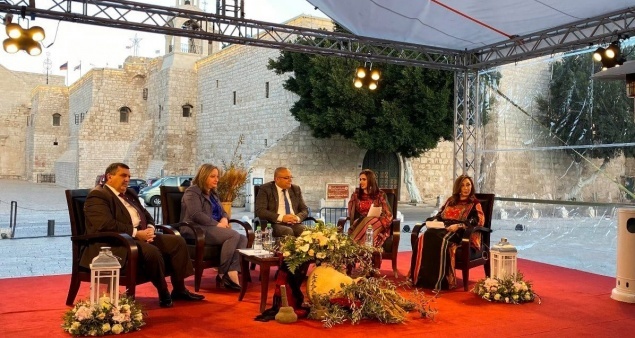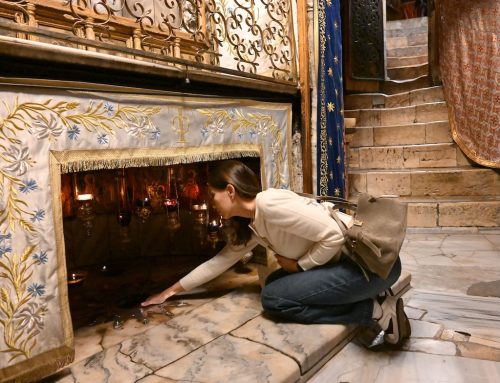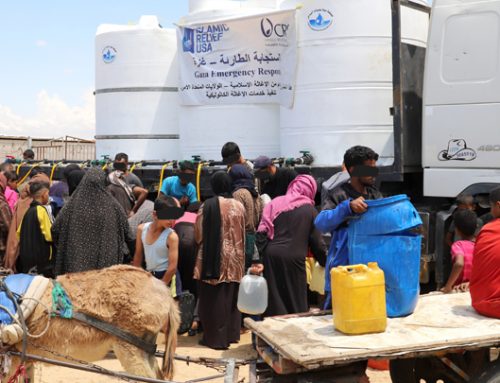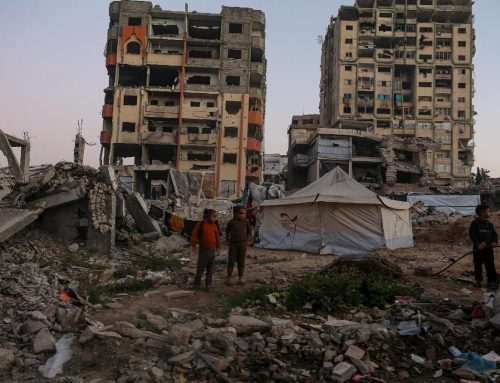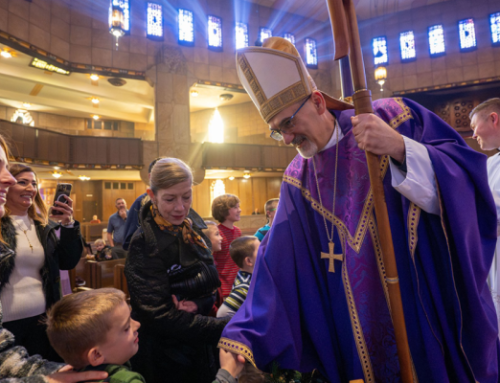BETHLEHEM – On Saturday, April 10, 2021, the activities of Bethlehem Arab Capital of Culture for the year 2021 were launched from Manger Square, after a year of delay due to the outbreak of Covid-19. The opening ceremony was hosted by H.E the Minister of Tourism and Antiquities Rula Ma’ayah, the Mayor of Bethlehem Adv. Anton Salman, and the Minister of Culture Dr. Atef Abu Saif, with the participation of 14 municipalities from around the world via video recordings that were broadcast during the celebration.
The activities of the celebration organized by the Arab League Educational, Cultural and Scientific Organization (ALECSO) in Tunisia, started with a recorded opening speech by Palestinian President Mahmoud Abbas. In his speech, the president highlighted the prominent role of Bethlehem, “the city of love and peace which reminds us of the message of Jesus Christ and His journey in Jerusalem and Bethlehem. A message of cultural and spiritual inspiration, and cultural richness in the principles of human dignity, justice and tolerance.” He added that “choosing Bethlehem as the Arab capital of culture confirms the originality of the Palestinian cultural identity.”
The celebration included a dance performance by “Diyar Dance Theatre” and a selection of media materials introducing Bethlehem and its cultural life, along with some of the prominent figures of Bethlehem, the history of Bethlehem and its various cultural contributions. A film about the “Lama Brothers”, who were pioneers of Arab cinema and two of the first people to produce films in the Arab world, was screened. The celebration also included a theatrical performance entitled “The First Well Monodrama”, which was inspired by a novel by the Bethlehemite novelist Jabra Ibrahim Jabra.
Zuhair Tmezi, director of the Cultural Office, explained that Palestine has submitted a request to approve Bethlehem as Arab Capital of Culture in 2015. Since the approval of this request in 2016, the first preparatory conference for these activities has been held, “taking into consideration the opinions of several international artists from various cultural fields.” Since 2019, the Ministerial Committee, which was formed following the approval of Bethlehem as Arab capital of culture for the year 2020, has been holding monthly meetings, aiming to develop a program of activities for this occasion. He added: “We are aiming to reflect the reality of the Palestinian society with its culture and literature, and the cultural and political life of its people through these activities.”
The history of selecting cultural capitals dates back to 1985, when European countries started choosing a cultural capital each year, starting with Athens. In 1988, The Arab League and ALECSO suggested selecting an Arab cultural capital each year, following in the footsteps of European countries. In 1996, the Egyptian city of Cairo was selected as the first cultural capital.
In 2009, Jerusalem was selected Arab capital of culture, to hereafter become a permanent Arab capital of culture. And given that no country has the ability to submit a request to choose more than one of its cities until after a 6-year lapse, Palestine submitted its second request for Bethlehem in 2015.
The current Arab capital of culture is the Moroccan city of Oujda. Following Bethlehem, the Jordanian city of Irbid will be the Arab capital of culture next year.
“Culture is the basis of the Palestinian national identity,” noted Dr. Atef Abu Saif. “In this city, the first Palestinian, Jesus Christ was born. It is a city visited by people from all over the world. Therefore, we want to focus on the national Palestinian identity through these cultural activities.” He stated that according to the original plan of the Ministerial Committee, these activities were to include Gaza, the occupied cities of 1948 and refugee camps in diaspora. “However, we had to make amendments so that it would be flexible and feasible in light of the pandemic,” noting that the committee will follow a quarterly plan subject to evaluation according to the measures that will be taken in the coming months, depending on the development of the health situation in Palestine.
The first phase of the plan is expected to focus on the resurrection of the Palestinian cultural heritage, including books and documents, and the history of Palestinian art, theater and cinema in the last 100 years. It will include various open theatrical performances.
For her part, the Minister of Tourism and Antiquities wished “for these activities to promote tourism, hoping for Bethlehem to start welcoming pilgrims from all over the world as soon as possible.”
The ceremonies are expected to start in May, after the end of Ramadan, and continue until April of 2022.
Source: Latin Patriarchate of Jerusalem

